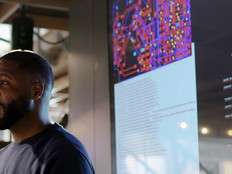David Litchliter
Serving as Mississippi CIO and executive director of IT since 1994, David Litchliter has the distinction of being one of the longest-tenured state CIOs. Litchliter was set to retire on June 30, a day that also happened to be his 57th birthday.
Litchliter spoke with StateTech Managing Editor Amy Schurr about his 35-year career in the Department of Information Technology Services, the state's new data center, and some of its greatest IT accomplishments.
STATETECH: Tell me about the Department of Information Technology Services.
LITCHLITER: The Department of Information Technology Services was originally created by legislative action in 1970 as the Central Data Processing Authority. The mission at that time was the consolidation of mainframe data centers, centralization of IT procurement and contracting, and approval of all IT purchases made by state agencies and institutions of higher learning. IT personnel remain distributed across the various agencies. The governor appoints a five-member lay board, on five-year staggered terms, that governs the agency. The board appoints the executive director, who also serves as the state CIO.
STATETECH: What is one of the greatest challenges of your job?
LITCHLITER: One of the greatest challenges in working with the individual agencies is in the area of enterprisewide solutions and shared services. With the majority of state IT staff being distributed across the agencies, the tendency is for the various agencies to seek individual, customized solutions for their business applications. Additionally, IT professionals like to make their own decisions regarding hardware and software standards, develop their own relationships with the vendor community, and prefer in many cases to house their own equipment within their agency.
STATETECH: So how do you counter that?
LITCHLITER: By trying to better educate the agency executives and the legislature regarding the benefits of consolidation of IT infrastructure and the concept of shared services. Many of the agencies have standing committees in the legislature as focal points for discussions and development of legislation to address their issues. Currently, there is no standing committee to focus specifically on IT issues, so working with the legislative leadership, the governor's staff and agency executives is required to build the necessary consensus for significant projects. Times are changing, and the IT discussion is happening more often in the halls of the Capitol.
STATETECH: What has been the biggest change?
LITCHLITER: More and more, the state leadership is looking first to technology as a way to save money. Where we used to not get significant questions and input from the state leadership, now we get lots of inquiries regarding IT consolidation, IT costs, efficiencies through shared services, transparency and the like.
More of the state's leadership are informed on technology issues and might have friends or acquaintances in the technology sector. They also pay attention to initiatives in other states with consolidations, centralization efforts and outsourcing contracts. Vendors are having more frequent conversations with the legislators and agency directors pushing their products and services.
STATETECH: And you have a brand new data center.
LITCHLITER: The new data center was huge for us, and it was great that the legislature funded it. We had been in the same location since 1970. It was not an adequate building, although we made do.
To get everything successfully moved over to the new data center in May was the culmination of a long-term goal for me. We have a great facility that's very resilient, with all the proper redundant systems and backup capabilities. The new center positions the state very well for future IT infrastructure consolidations and the proper housing of the state's mission-critical information systems. Now it's just a matter of making sure this asset gets used to its fullest potential.
The data center houses all the critical major shared systems: accounting, payroll and human resources. We are in the process of beginning the implementation of a new ERP system for state government and a new tax/revenue system. The Department of Health has its statewide mission-critical systems in the data center, as do the Highway Patrol and the Department of Human Services. There has been a significant proliferation of server farms throughout state government over the past decade. Using virtualization technology, we are trying to consolidate this dispersed infrastructure into the central facility where appropriate. Sometimes it makes more sense to virtualize within the state agency environment. We're working through those decisions and marching down that road. I think we're well-positioned from an infrastructure standpoint to react to whatever technology does next.
STATETECH: Can you tell me about another IT project with broad reach?
LITCHLITER: The Mississippi Wireless Information Network is a high-speed digital radio system for public safety and first responders. The need for this system was very evident after ÂHurricane Katrina when the first responders arrived at the coast and couldn't communicate with each other. All land-line and cellular communications were out, and most of the disparate radio systems for the local, state and federal entities were not functional or were overloaded. Gov. Barbour recognized these serious shortcomings and worked very diligently with Congress to get the funding to rectify the situation.
What really appeals to me about that project is that it's a way for multiple levels of government to cooperate on a common project for the good of everybody, and to do it at a much lower cost than they could all do individually.
We are about three-fourths of the way through with our tower construction. We started with implementation on the coast so we'd be ready for the next hurricane season. And with initiatives at the federal level, we were approved for a federal grant to add high-speed [Long Term Evolution] data communications to that infrastructure. The LTE part of the project should be complete by the fall of 2013, but the radio system should be complete next spring and afford us 98 percent coverage statewide.
STATETECH: LTE is the next-generation public safety communication technology, right?
LITCHLITER: Yes, it is. It's going to give us a great start on high-speed communications for all first responders. Ambulance services statewide will be connected to provide better in-route emergency care. The ambulances will have the equipment necessary to transmit data from an EKG and other vital statistics to a 24x7 triage center to direct the ambulance to whatever trauma-level hospital they need to go to. These are the kind of projects that really excite me; being able to do something for citizens. If there's a citizen having a heart attack and responders receive appropriate, real-time data to get them to the right trauma center for treatment, to me that's what it's all about.
STATETECH: What do you think about your choice of a career in the public sector?
LITCHLITER: Looking back on my career, I don't know that there is a more challenging or satisfying job in state government than CIO. You get to learn about everything the other state entities are doing, and you get exposed to every potential business problem you could be exposed to.
You have the challenge of working with elected officials and governors, and you collaborate with other agency executives and help them plan and deal with their business problems and technology issues. I don't know that you can find a more fulfilling job.
STATETECH: When did you join Mississippi IT?
LITCHLITER: I graduated from the University of Southern Mississippi with a Bachelors degree in Computer Science in May of 1976 and started work later that month with the central IT agency in Mississippi state government, the Central Data Processing Authority.
STATETECH: What kind of computing environment did you initially encounter?
LITCHLITER: There were no personal computers and very few midrange computers in state government at the time. It was mainframe, green screen applications, or it wasn't done. I primarily worked as a programmer on application development with customer agencies.
STATETECH: When did you become state CIO?
LITCHLITER: I was fortunate enough to be offered the position in 1994. My predecessor had held the job for 17 years.
STATETECH: What kind of computing environment did you inherit?
LITCHLITER: Data center consolidation happened in Mississippi in the '70s and early '80s. The tone of the environment continued to be strong toward centralization. Many agencies were pressing for distributed computing capabilities and client/server applications. PCs were there, but they were basically word processors on desks.
The political environment at the time was challenging. In a government environment where every agency has their own budget and, in some cases, stronger political connections, they don't like having an administrative oversight agency directing them toward certain standards or solutions. Several state agencies had become a little disgruntled because they were not being afforded opportunities to use what they considered the latest and greatest technology. Because of that, there was a strong political move to dismantle the central oversight agency. My first task was to work with a legislative study committee to evaluate the need for, and effectiveness of, the central IT oversight model. The study resulted in an agency name change to the Mississippi Department of Information Technology Services. The legislature, while leaving the control functions and responsibilities of the original legislation intact, also asked that the focus of the agency lean more toward providing IT services and less on the control duties.
STATETECH: Is the fact that the CIO doesn't report to the governor one of the reasons for your long tenure?
LITCHLITER: I would have to say that it's played a role, but in reality, if the governor wanted to make a change, it wouldn't be difficult. Fortunately, we've had very good relationships with our governors and have always had very good appointments to our board.
STATETECH: Like many IT roles, it sounds like the people aspect of your job is more challenging than the technology part.
LITCHLITER: As a state CIO, strong relationships with other agency executives, the governor's office, and the state legislature are critical in getting the support needed to be successful. While the technology part of the job is significantly more difficult than in the past, with technology changing at shorter and shorter intervals and the vast landscape of options, there are plenty of ways to address that component. The technical staff in the agency provides valuable input to that process, the vendor community is ready and willing to educate, and organizations like NASCIO provide an invaluable forum for discussions and comparisons with peers from around the country, many of whom are facing the same challenges.
STATETECH: Speaking of technologies, does Mississippi have virtualization and cloud computing deployed or planned?
LITCHLITER: The state leadership has really caught on to the virtualization story and are hearing about lower cost of ownership and significant savings. Our agency as well as others have been working with virtualization technology for several years and certainly see the value and corresponding efficiencies associated with it. We are currently focused on server virtualization and primarily on the mission-critical, citizen-facing applications that need high reliability and recovery capabilities. We haven't moved quickly into desktop virtualization and will likely depend heavily on the individual agencies for implementations at that level. As far as cloud computing goes, I would consider many of the services we provide across state government as being provided from a Mississippi government "private cloud." We are considering the provisioning of some common business functions and software services from the "public cloud."
STATETECH: What was the biggest challenge of your IT career?
LITCHLITER: It is really several ongoing challenges. You have the challenge of educating and gaining the trust of the state leadership, and you have the challenge of remaining flexible enough in your technology infrastructure to accommodate opportunities presented by evolving technologies.
All elected officials have acquaintances that sell or represent someone that sells technology products. Budgets are very tight so, when someone is telling them they can save $10 or $15 million with this software product or technical approach, naturally, they're going to listen. Dealing with those kinds of situations takes a great deal of time and effort and continues to be a challenge, but you need to keep the communications lines open and the relationships with the state leaders in a good place.
STATETECH: And then comes an election ...
LITCHLITER: Yes, once you develop the relationships and build the agency alliances, there's an election, and you get a new group of people to work with. Starting that process over every 4 years is very challenging.
STATETECH: How did IT aid your response after Katrina and help residents in time of need?
LITCHLITER: The state agencies addressed their response needs after Katrina primarily with their internal staff. The vendor community was very helpful in restoring basic communications and offering assistance with equipment and software applications to help manage temporary shelters, the tracking of missing persons, and organizing information dealing with the staging and distribution of aid to the residents of the gulf coast. The aftermath of the storm clearly showed a need for a common, resilient communication system for first responders to provide reliable, multi-entity communications in the event of a disaster. Gov. Barbour and the state legislature quickly made this issue a high priority, and we have moved far down that road and will soon complete implementation of a new statewide, wireless digital communications system for use by all public safety and first-responder agencies.
STATETECH: Do you think the Mississippi CIO should report to the governor?
LITCHLITER: In my opinion, there is not one model that fits all states. The push by NASIRE (now NASCIO) to place CIOs directly on their governor's cabinet through direct governor appointment approximately 15 years ago has contributed to the average state CIO tenure being less than 24 months. While this might make sense from a political perspective, it is not, in my opinion, a prerequisite for getting gubernatorial support for state IT initiatives. In a state like Mississippi, with a constitutionally strong legislature that controls agency and project funding, it may not be the best approach. The nature of being a direct appointee of the governor almost guarantees a change in the position every time the governor changes and certainly every time you have a party change. I have had the great fortune to have worked with three governors across four and a half four-year terms and experienced party changes after two elections. Since the governor is the CEO of the state and the CIO is an employee of the executive branch, it makes sense that there is adequate control and choice by the governor of who fills the state CIO role without making it a political appointment. While not being a direct appointee, I can assure you that had one of those governors asked me to step down, I would have done so immediately.
Significant IT projects normally take from three to five years to get funding, go through a public procurement process, negotiate a contract and complete the work. With today's CIO tenure averages, this type of project would span the tenure of two, maybe three CIOs. With IT playing a larger role in the provisioning of government services, continuity of the person responsible for seeing these projects through is even more important.
STATETECH: What are your hopes for the agency?
LITCHLITER: I hope the agency will continue to enjoy a very strong, productive relationship with the leadership in both the governor's office and the legislature. You know, I've been here longer than I was in my mother's house growing up. It really is home to me, and I am sure that I will miss everything about it.
I hope that the Mississippi legislature will see some opportunities for further IT consolidation. It makes sense to bring some of the IT employees that are distributed across agencies into the central agency. I don't believe application support or the role of a business analyst belongs in the central IT agency. But for infrastructure support; reducing costly, redundant hardware, software, and expensive, environmentally controlled square footage for data centers; and contracting for commodity IT purchases statewide, centralization and shared IT services make sense. Otherwise, you end up with 50 agencies that have 50 different standards. You get no leverage on price, and you don't achieve the efficiency that you could.
There is a very solid IT infrastructure in place with the new data center and the high-speed, redundant, fiber network connecting the majority of our state buildings. These resources should position the state well to move forward from an IT perspective.
STATETECH: How do you plan to spend your time in retirement?
LITCHLITER: That's a great question. You'd probably have to ask my boss -- my wife -- how she is going to plan my time for me. I have four children: one son in the working world, one son in college, one in high school and one in middle school. My two youngest are 16- and 13-year-old daughters. They still don't seem to mind having Daddy around. They are both very active teenagers, and I have missed a lot of their sporting events, track meets and softball games and am really looking forward to being able to attend more of their activities.
I don't have any plans for work right now. As CIO, I am the IT contracting agent for the state, and our state ethics law prohibits me from working for any entity that I have signed a contract with for 12 months after I leave employment. If something comes up that interests me, I'd certainly be open to discussing it, but right now, I'm just focused on taking some fun trips with my wife and spending more time with my daughters while they are still at home.
Mississippi Department of Information Technology Services
Strategic Master Plan 2011-2013 Goals
- Provide and support enterprise technology infrastructure components to enable the effective and efficient use of IT.
- Safeguard information and telecommunications technology assets.
- Develop and promote enterprise solutions to maximize the benefits of shared technology solutions.
- Provide innovative and timely IT training to all levels of state employees.







